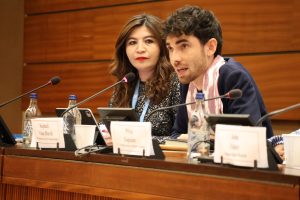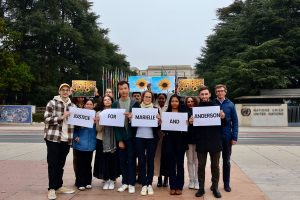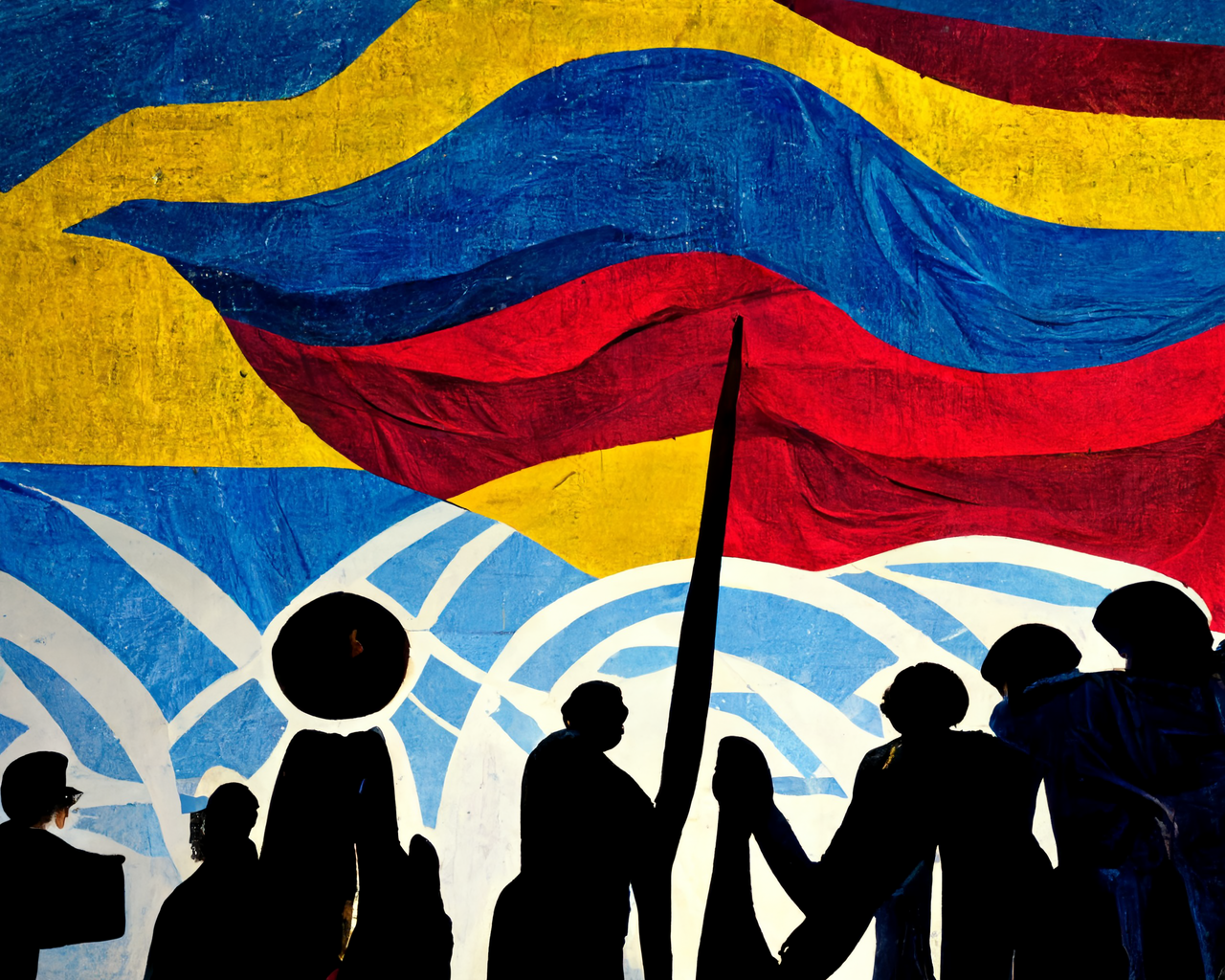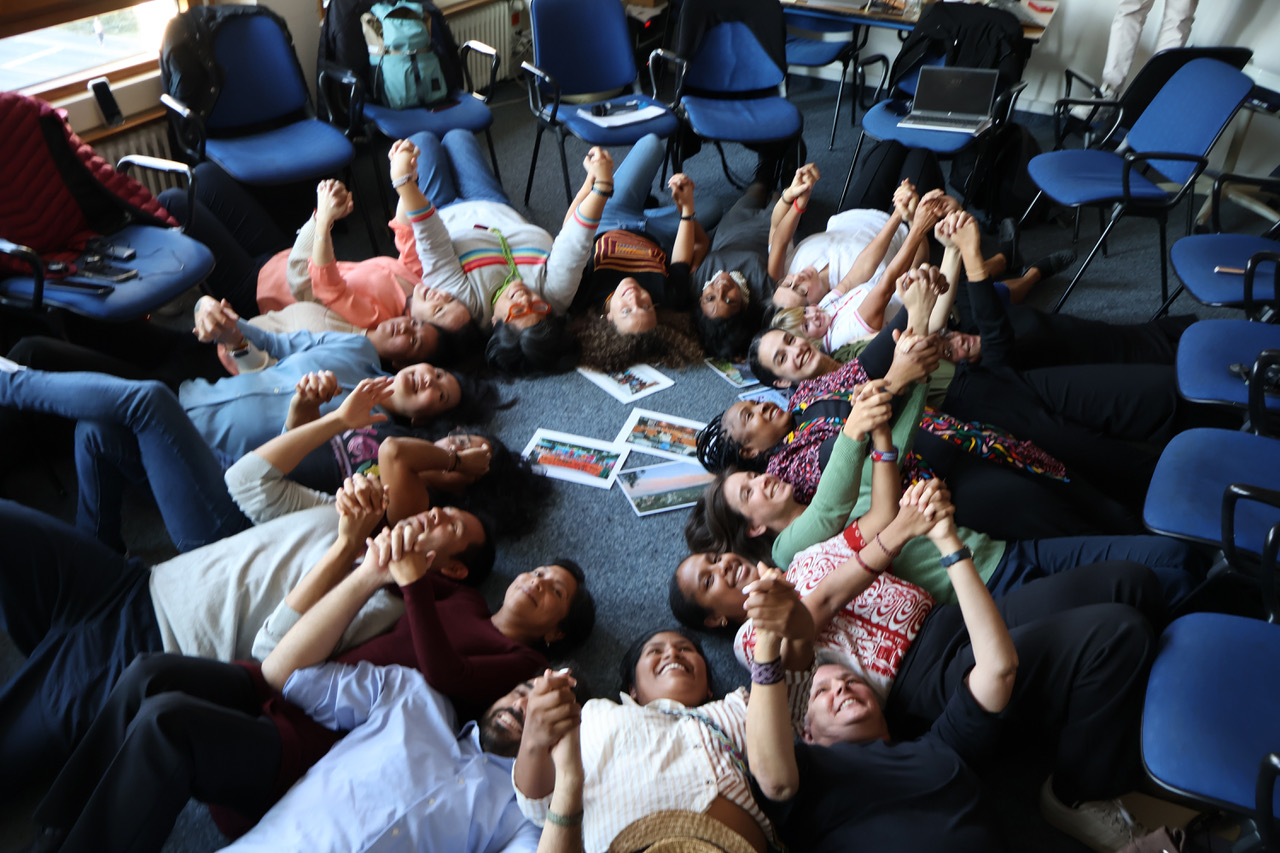Authoritarianism feeds on insecurity. Unscrupulous corporations rely on indifferent consumers and investors. And those responsible for atrocity crimes are emboldened by a sense of impunity.
Faced with turbulence, ISHR’s core values – including a principled approach to human rights, solidarity with human rights defenders, respectful and empowering partnerships, and a commitment to diversity, transparency and accountability – become critical navigational tools. Guided by these values, we will relentlessly pursue our mission to support human rights defenders in their work for freedom, equality and justice, while remaining dynamic and adapting our tactics to an uncertain and rapidly changing world. And our collective action with you, our partners, will drive human rights progress.
Confronting challenges
In the years ahead, we foresee a range of challenges, while also remaining convinced that the fairer, more peaceful, more sustainable future that defenders strive for is possible.
The first challenge is to resist and reverse the erosion of international human rights law. The selective and discriminatory application of human rights standards by some State and non-State actors undermines the universality of rights, as well as the credibility and influence of those engaged in such double standards. Human rights are also eroded when the language of rights, and interests such as development and national security, are instrumentalised to justify violations and arbitrary and disproportionate restrictions, including with respect to the rights of women, Indigenous peoples, LGBTIQ+ persons and environmental rights. ISHR’s commitment is to promote a consistent and principled approach to human rights for all persons, everywhere, without discrimination and without double standards.

Photo: ISHR
A second challenge is to advance accountability for human rights violations, both as an integral aspect of the right to effective remedy and because impunity licenses further violations. ISHR is committed to supporting human rights defenders who document, expose and promote international accountability for grave violations, and who are frequently targeted because of this vital work. In partnership with defenders, we will promote, push and support action by the Human Rights Council and other bodies to pursue accountability for atrocity crimes, including in Afghanistan, China, Israel/Palestine, Russia/Ukraine, Sudan and Venezuela. We will continue our work to ensure that international human rights bodies – as well as international justice and accountability mechanisms – are safe and accessible and that all persons can cooperate with such bodies free from any form of intimidation, reprisal or sanction.
A third challenge is that of inadequate resources and declining investment in human rights. The UN human rights system remains chronically underfunded, while many governments and philanthropic trusts and foundations are slashing investment in the international human rights movement precisely at a time when increased resources are needed most. If it continues, this reduced investment will not only accelerate the erosion of rights and diminish the prospects of accountability for grave violations, but create an opportunity for more nefarious actors – both States as well as GONGOs (government organised or controlled NGOs) – to swoop in, buy out and completely co-opt and control the system. Over the last few years, the term ‘enshitiffication’ has been widely used to describe the decay of online platforms as the interests of consumers and other stakeholders are wholly subverted to the pursuit of profits. It could equally be used to describe the erosion and decay of the international human rights system and potentially the human rights movement if the interests of human rights defenders, as well as victims and survivors of violations, continue to be trumped in the pursuit of populist politics.
Mounting a counter-offensive
If 2024 was a year in which we resisted regress, 2025 must be the year in which we mount an ambitious human rights counter-offensive, the success of which will be underpinned by a number of elements:
- A shared vision: We need to powerfully reaffirm that respect for universal human rights and the rule of law are indispensable to a world that is fair, just and peaceful, and that the work of human rights defenders is essential to effectively realise human rights for everyone, everywhere.
- A broad support base and commitment to cooperation: We need to build strong, diverse intersectional coalitions. We need to invite all those who share a commitment to values of freedom, dignity, equality, solidarity and justice to join the team. Our commitment to cooperation must be multifaceted. We must collaborate within civil society, ensure protection from reprisals for those who cooperate with the UN, and demand good faith and substantive cooperation by States with human rights bodies and international justice mechanisms, including the International Court of Justice and the International Criminal Court.
- A belief we can win: No great advance is achieved without ambition and a bold belief that victory is possible. Our recent against-the-odds defeats of powerful but grossly unqualified candidates for the Human Rights Council, including Russia and Saudi Arabia, are testament to that.
- A well resourced and protected frontline: Human rights defenders are at the frontline, pushing for human rights change and resisting human rights regress. They must be provided with the legal recognition and protection, as well as the financial and political support, that is necessary for this vital work.
- The right people at the table: Complementing their work on the ground, human rights defenders are increasingly turning to the international human rights system for justice, accountability and solidarity. We are committed to supporting defenders’ access and participation in multilateral fora – ensuring that they can speak with their own voices, share their own expertise, articulate their own demands, and shape solutions that are community-informed, owned and led.
- A smart use of tools and tactics: We have international human rights law on our side. It provides a powerful tool to promote freedom and justice, to prevent and resolve crises and conflicts, and to ensure accountability for violations and abuses. We must maintain its integrity and effectiveness by deploying it in a principled manner, and guarding against its instrumentalisation or co-optation. We must also continue to develop human rights standards, including through normative initiatives such as the Declaration +25 and the campaign to codify the crime of gender apartheid, as well as through strategic litigation and advocacy at the national, regional and international levels. With the Declaration +25 articulating the current legal baseline on the protection of defenders, there are opportunities to build on groundbreaking jurisprudence on the right to defend rights.
- An effective communication plan: We need to convincingly tell our own story, countering disinformation and amplifying compelling narratives that center human rights defenders, make the case that respect for human rights lifts us all up and is not a zero sum game. We need to provide a vision and hope for a more fair, just and sustainable future.
- Sustainable resources and supply lines: We will not win and cannot survive on starvation rations. We need investors – governments, foundations, corporations and individuals – to join us and create the resources that enable us to be sustainable, innovative and impactful. This investment needs to be made in civil society at the national, regional and international levels, as well as in the international human rights system to which frontline defenders increasingly turn when justice and accountability are denied at the national level. The realisation of human rights will provide an unmatched return on investment.
- Resilience and regeneration: Making human rights progress frequently involves confronting power, privilege and prejudice. This requires persistence and resolve. It can also involve risk. We need partners – financial, diplomatic as well as individual supporters – with a long-term commitment to human rights progress as well as a preparedness to take some risks and learn some lessons along the way. Our activism must be sustainable and regenerative. We need to prioritise self-care, community care and solidarity, and celebrate the small victories that mark the path to any major human rights success.
- Being the change: Finally, we need to be the change, practising and projecting values of diversity, equity, inclusion and accountability, both within the human rights movement and externally. Eleanor Roosevelt’s wisdom from 1958 that human rights change begins in small places close to home rings just as true today.

Photo: ISHR
Taking action for a fairer future now
As we reflect on 2024, we celebrate the many advances to which we contributed with your support – from developing the capacities of over 1,000 human rights defenders and partnering with them to drive change on the ground, to building coalitions and supporting international mechanisms on issues including racial justice, the rights of women, LGBTIQ+ persons and Indigenous peoples as well as the situations in Afghanistan, China, Israel/Palestine, Russia/Ukraine, Sudan, Yemen and Venezuela among others.
At the same time, we deplore ongoing gross violations and express our solidarity with human rights defenders in each of these contexts, calling on the international community to take all necessary measures to address the root causes, provide justice to victims, and pursue accountability for perpetrators.
As we embark on 2025, with your support, we pledge to strengthen our work with defenders, enabling them to expose injustice, pursue accountability, seek international solidarity, and help shape community-based solutions to the multiple crises humanity faces. And we invite you to take action for a fairer future now, whether by sharing our training and information material, amplifying our messages on social media, making a donation or in-kind contribution, or participating in our campaigns. Your every action makes a difference.
Phil Lynch, ISHR Executive Director
Vrinda Grover, Chair (outgoing) of the ISHR Board
Taaka Awori, Chair (incoming) of the ISHR Board






